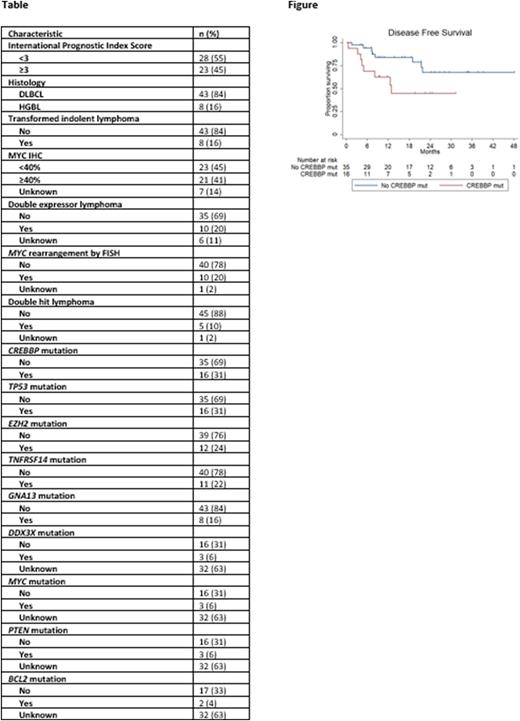Abstract
Background Comprehensive genomic analyses of tumor biopsies (bx) from patients (pts) with newly-diagnosed germinal center B cell (GCB) diffuse large B cell lymphoma (DLBCL) and high grade B cell lymphoma (HGBL) have identified molecular subtypes predictive of inferior survival outcomes following receipt of first-line immunochemotherapy (PMID: 29713087, 29641966, 30523719, 30523716). These experimentally-defined molecular subtypes are characterized by somatic mutations (mut), which can be detected through clinical laboratory mutation analysis (CLMA). We sought to identify the frequency and predictive value of these mut as detected by CLMA performed at our center on tumor bx from pts with newly-diagnosed GCB DLBCL/HGBL.
Methods Pts diagnosed with de novo or previously-untreated transformed indolent GCB DLBCL/HGBL defined by Hans algorithm from 2015-21 who received R-CHOP or R-EPOCH in the first-line setting whose initial tumor bx underwent CLMA performed at the University of Pennsylvania with either the lymphoma sequencing panel (LSP) or PennSeq Lymphoma panel (PSLP) were retrospectively analyzed. Immunohistochemical staining (IHC) for MYC and BCL2 expression as well as fluorescence in situ hybridization (FISH) for MYC, BCL2 and BCL6 rearrangements were performed as per institutional standard. Therapy was given at the discretion of the treating physician. Disease free survival (DFS) was defined as the interval between diagnosis of DLBCL/HGBL to DLBCL/HGBL relapse or last follow-up in remission. Overall survival (OS) was defined as the interval between diagnosis and time of death or last follow-up while alive. Data were censored on 7/1/22.
Results CLMA was performed on 59 pt tumor bx with 58 successful assays (98% success rate) and a median result turnaround time (TAT) of 16 days. 5 bx were excluded due to specific request for CLMA by treating clinician (3) or diagnosing pathologist (2) and 2 additional bx were excluded due to lack of clinical follow-up, resulting in analysis of 51 bx performed at random from pts evaluable for survival (n=32 LSP, n=19 PSLP). Baseline characteristics, including mut in genes of interest (GOI) identified in the above references, are listed in the Table. Of note, BCL2, MYC, DDX3X and PTEN mutations were not included the LSP and therefore not included in statistical analyses due to small sample size. R-EPOCH was received by 15 pts (29%) and R-CHOP by 36 pts (71%). With a median follow-up of 25.2 months, the Kaplan Meier estimate of 2 year (y) DFS was 60% (95% confidence interval [CI] 41-74%) and 2y OS 80% (95% CI 64-89%). As shown in the Figure, 2y DFS was significantly lower for pts with CREBBP mut vs not (45% [95% CI 18-68%] vs 67% [95% CI 44-83%], P=0.045), but not for pts based on other mut analyzed. All progression events for pts with CREBBP mut occurred ≤12 months (mo) from diagnosis. Of 16 bx with CREBBP mut, 15 mut were predicted to result in loss of function (LOF) (PMID: 28890946, 21390126). CREBBP mut were not significantly associated with baseline characteristics except for EZH2 mut (50% with CREBBP mut vs 11% no CREBBP mut, P=0.005 by Fisher's exact). Characteristics listed in the Table which were predictive of disease relapse by 2y with P<0.10 on univariate Cox regression analysis were International Prognostic Index Score ≥3 vs <3 (hazard ratio [HR] 2.3, 95% CI 0.86-6.5, P=0.098), HGBL vs DLBCL histology (HR 5.4, 95% CI 1.8-15.7, P=0.002), double hit lymphoma vs not (HR 9.0, 95% CI 2.6-30.8, P<0.001) and CREBBP mut vs not (HR 2.6, 95% CI 0.98-7.0, P=0.054).
Conclusions In this cohort of pts with newly-diagnosed GCB DLBCL/HGBL treated with first-line immunochemotherapy whose tumor bx underwent CLMA at random, mut in CREBBP resulting in predicted LOF were frequently detected, not associated with routinely-analyzed baseline clinicopathologic characteristics and predicted for significantly lower 2y DFS with progression events occurring early. These findings may be of interest in light of availability of agents which may overcome loss of histone acetyltransferase function. Given the high success rate and rapid TAT of CLMA, results from this assay could inform the management of pts with newly-diagnosed DLBCL/HGBL in real-time, and additional efforts to incorporate findings from experimental molecular assays into CLMA-based studies as well as those to standardize CLMA gene panels may ultimately benefit this pt population.
Disclosures
Landsburg:Morphosys: Membership on an entity's Board of Directors or advisory committees; Karyopharm: Membership on an entity's Board of Directors or advisory committees; Epizyme: Membership on an entity's Board of Directors or advisory committees; ADC Therapeutics: Membership on an entity's Board of Directors or advisory committees; Curis, Inc: Research Funding; Calithera: Membership on an entity's Board of Directors or advisory committees; Triphase: Research Funding. Schuster:Acerta: Consultancy; BiGene: Consultancy; Celgene: Consultancy, Research Funding; Genetech/Roche: Consultancy, Research Funding; Incyte: Consultancy, Research Funding; Janssen: Consultancy; Legend Biotech: Consultancy; Loxo: Consultancy; Morphosys: Consultancy; MustangBio: Consultancy; Nordic: Consultancy; Nanovector: Consultancy; Novartis: Consultancy, Research Funding; Regeneron: Consultancy, Membership on an entity's Board of Directors or advisory committees; Abbvie: Research Funding; Adaptive Biotechnologies: Research Funding; DTRM: Research Funding; Juno Therapeutics: Research Funding; Merck: Research Funding; Pharmacyclics: Research Funding; TG Therapeutics: Research Funding. Dwivedy Nasta:Roche: Research Funding; Pharmacyclics: Research Funding; Rafael: Research Funding; FortySeven/Gilead: Research Funding. Gerson:Genentech: Consultancy; Abbvie: Consultancy; Loxo Oncology: Research Funding. Barta:Seagen: Honoraria; Janssen: Other: Independent Data Monitoring Committee member; Acrotech: Honoraria; Daiichi Sankyo: Consultancy; Affimed: Consultancy; Kyowa Kirin: Consultancy, Honoraria. Svoboda:TG: Research Funding; SEAGEN: Consultancy, Research Funding; Pharmacyclics: Consultancy, Research Funding; Merck: Research Funding; Incyte: Membership on an entity's Board of Directors or advisory committees, Research Funding; Genmab: Consultancy; BMS: Consultancy, Research Funding; Atara: Consultancy; Astra Zeneca: Membership on an entity's Board of Directors or advisory committees, Research Funding; Adaptive: Membership on an entity's Board of Directors or advisory committees, Research Funding; ADCT: Consultancy. Chong:Tessa: Consultancy; Juno/BMS: Consultancy; Novartis: Consultancy; KITE: Consultancy; Beigene: Consultancy. Lim:EUSA Pharma: Honoraria.
Author notes
Asterisk with author names denotes non-ASH members.


This feature is available to Subscribers Only
Sign In or Create an Account Close Modal